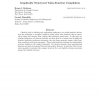Free Online Productivity Tools
i2Speak
i2Symbol
i2OCR
iTex2Img
iWeb2Print
iWeb2Shot
i2Type
iPdf2Split
iPdf2Merge
i2Bopomofo
i2Arabic
i2Style
i2Image
i2PDF
iLatex2Rtf
Sci2ools
100
click to vote
AI
2008
Springer
2008
Springer
Graphically structured value-function compilation
Classical work on eliciting and representing preferences over multi-attribute alternatives has attempted to recognize conditions under which value functions take on particularly simple and compact form, making their elicitation much easier. In this paper we consider preferences over discrete domains, and show that for a certain class of simple and intuitive qualitative preference statements, one can always generate compact value functions consistent with these statements. These value functions maintain the independence structure implicit in the original statements. For discrete domains, these representation theorems are much more general than previous results. However, we also show that it is not always possible to maintain this compact structure if we add explicit ordering constraints among the available outcomes.
AI 2008 | Artificial Intelligence | Compact Value Functions | Intuitive Qualitative Preference | Value Functions |
Related Content
| Added | 08 Dec 2010 |
| Updated | 08 Dec 2010 |
| Type | Journal |
| Year | 2008 |
| Where | AI |
| Authors | Ronen I. Brafman, Carmel Domshlak |
Comments (0)

